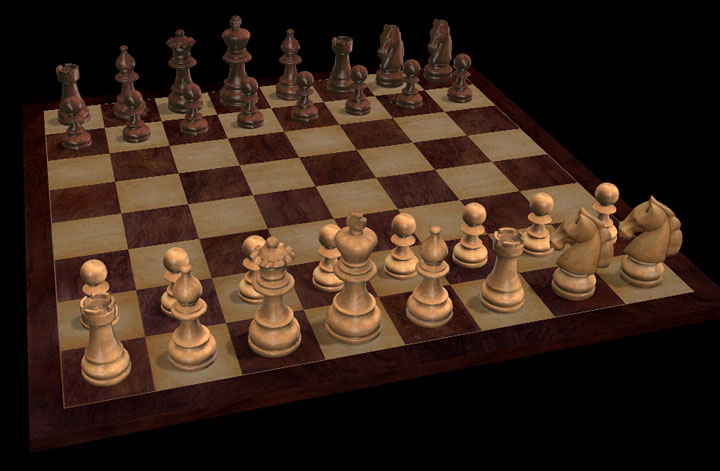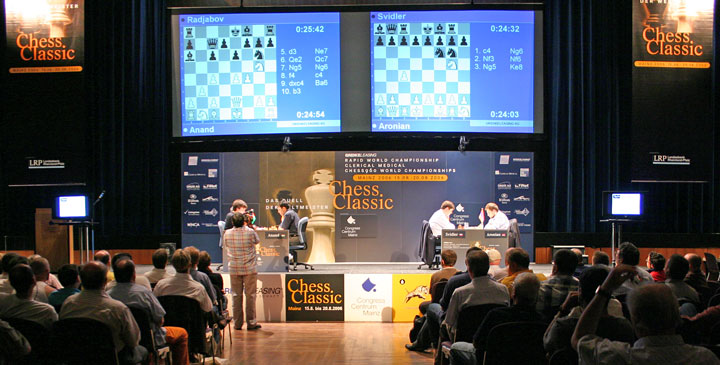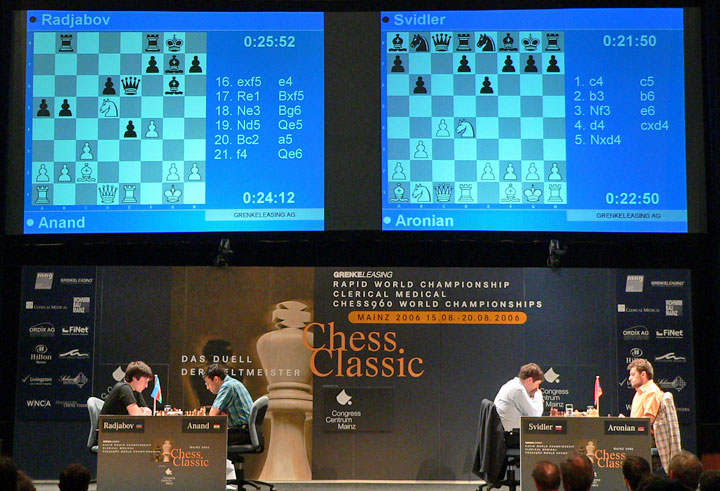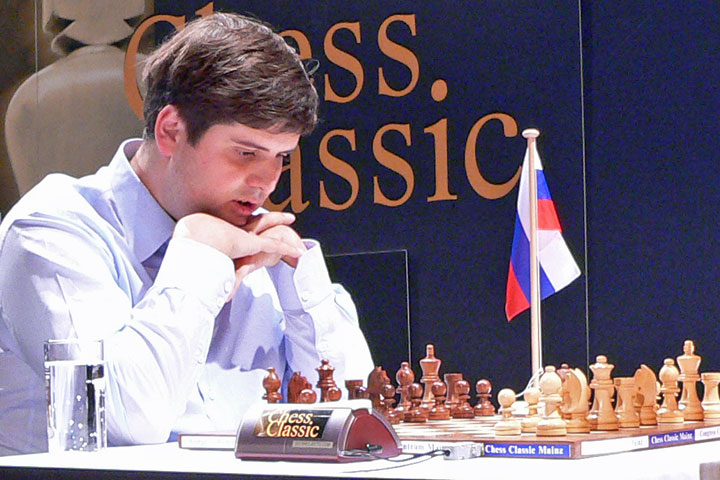What is Chess960?
There is a comprehensive article on Chess960 on Wikipedia, which you can consult on all the details of this variant. Here I will only summarize some of the main points.
In 1996 former world chess champion Bobby Fischer announced, in Buenos Aires, Argentina, a new variant of chess that became known as Fischer Random Chess. It employed the normal chess board and pieces, but the starting position of the pieces on the first rank was randomized, with the pawns being placed on the second ranks as in standard chess. The position of the pieces was reflected for both sides.
Fischer's proposal was itself a variant of Shuffle Chess, which was first played in the late 18th century. But it had some additional rules and restrictions: the bishops must be placed on opposite-colour squares, and the king must be placed on a square between the rooks. The game has some fairly complex castling rules, which you can study in the Wiki article.
The name Fischer Random Chess soon turned into Fischerrandom, and after he had introduced this variant into the Mainz Chess Classic in 1991 organiser Hans-Walter Schmitt changed it to Chess960, which reflects the number of different starting positions that are possible in the game. A few years before he died Bobby Fischer consulted me on a possible match against World Champion Viswanathan Anand. In our phone conversations, he referred to the game as "Fischer Random" or, more often, "New Chess".

The typical start of a Chess960 game — note that the h-pawns are undefended
Why does anyone need this new chess variant?
Fischer's intention in introducing the new rules was to eliminate the incredible level of openings preparation that prevails in contemporary chess. In my conversations with him, I admitted that this was a real problem: imagine a world championship in a few years from now, where the two players reel off 28 moves of a known variation, in just a few minutes — and then one of them plays a novelty. His opponent thinks for an hour and resigns the game! Bobby enjoyed this somewhat facetious scenario that justified his introduction of New Chess, where players must devise original moves from the start. Memorizing thousands of home prepared opening lines would be eliminated, and the playing field would be levelled.
I undertook a few public and private 960 experiments with strong players. In the ill-thought-out expectation that human grandmasters would be able to score better than computers, we arranged matches against Alexei Shirov and Vishy Anand, against GM Artur Yusupov, and then Pocket Fritz against Peter Leko and Michael Adams. The results were disappointing, especially for me, rooting for the players and hoping for a reprieve in the man-machine circuit.
But the reality was that as computers grew stronger they had an ever greater dominance against humans. The only chance a strong GM had was to come out of the opening with very good ideas and a concrete plan on how to proceed. Computers, on the other hand, see the position for the first time. But in Chess960 this applies to both sides, and that is far more disconcerting for the human than for the computer.
The disadvantage of Chess960
In human vs human Chess960 games, the players are much more evenly matched. In recent tournaments and matches, e.g. the one a fortnight ago between Magnus Carlsen and Hikaru Nakamura, the strongest players tend to win, using only playing skill and general understanding of the game — as opposed to openings preparation and tricks.
In 2008 FIDE accepted the inevitable and added Chess960 as Guidelines II — Chess960 Rules of its Laws of Chess. Slowly the game gained popularity, though it did not take off the way its devotees hoped. There are some grave disadvantages, which I noticed all too clearly when I attended the Mainz Chess Classic over a decade ago.

Take a look at the above picture, from a rapid chess event played in 2006. In a traditional game Anand and Radjabov have a familiar, very promising position on the board. Aronian vs Svidler, a Chess960 rapid game, has a weird position the players still pondering on move four.

Here's another example: Svidler is still wondering, on move five, if he can move a pawn and not lose instantly, while Anand is pondering his 22nd move in a very interesting position. In the commentary booths, the GMs were discussing Anand's options with great excitement – he seemed to be struggling to equalize with white in a Sveshnikov! They were completely silent on the Aronian-Svidler game, as nobody had the faintest idea of what was going on. I think it was Tim Krabbé who compared commenting on a Fischer Random game to conducting a guided tour of an art gallery that you are visiting for the first time. Very apt.
Another problem is that the Chess960 positions, regarding their winning probabilities, are often asymmetric. We know this for example from a very large number of computer games — over 200,000 played by the Computer Chess Ratings List team in 2005–2008.
There are a few other disadvantages. Traditional chess offers continuity: you see a very nice game in a certain opening or a disaster with it, and you wait for someone else to play it, to see how they fare. That is impossible in Chess960. The same applies to learning from your mistakes: if something went wrong in a game there is no incentive to look for an improvement. You are never going to get the position again.
Starting positions most/least advantageous for White
You can move the pieces on the above boards to think about how to start the games. Full data for all 960 positions can be found on this special CCRL statistics page. Some give White substantial advantage, some are simply bizarre, causing players to cringe, and some invite blunders and result in very short games. But many are interesting and exciting.
So what to do about Chess960?
There have been many attempts to improve on Fischer Random and Chess960. For instance, there are suggestions to modify the castling rules, which are not easy to comprehend and quite off-putting. John Kipling Lewis proposed a simplification that results in Chess480 — half the Chess960 positions are mirrors but different due to the complex castling rules, which Lewis avoids. Others have suggested that kings and rooks should start in their usual places, and only the other pieces are placed randomly.
To remedy the problem of biased positions (in which one side has a clear advantage) the suggestion is that Chess960 tournaments should have two games with swapped colours per encounter. But this means you have to halve the time per game or halve the number of games per tournament. Also in the second game players have learned from the first one: the g-pawn is vulnerable and can be easily blundered, as my opponent just did. I must be very careful about that. Or they learn from the clever ideas of the other player and can use them in the second game.
But the main problem of Chess960, in my opinion, is that you start with absolutely no prior information or practice. Preparation has, for more than a thousand years, been an integral part of chess — and greatly appreciated by its adherents. Chess fans swooned over new openings ideas the masters have come up with in-home preparation, and the ideas and strategies that are born of this kind of research have improved our understanding of the game.
The main problem arose in the second half of the 20th century, and especially since the advent of computers and chess databases: openings preparation started to completely dominate chess. Chess960 eliminates this problem, but it does so at the cost of turning off an important aspect of human creativity. Must we do away with all preparation in order to compensate for the exaggerated degree to which it had grown? Or is there a compromise?
Kasparov's proposal
In 2005 (I believe it was) I discussed Fischer Random and Chess960 with Garry Kasparov. He came up with the following suggestion: we select ten interesting and exciting positions to be used in tournaments and allow players to prepare in advance. Immediately before the start of each round, the audience in the hall (or on the Internet) selects one of these ten positions for all games. This provides spectator participation, which is never a bad thing. Players have some basic preparation for all ten positions — they do not have to start the game with a long think about "can I move the c-pawn?" And commentators can come prepared as well.
At the time I was, as mentioned above, talking to Bobby Fischer about his plans for a comeback with a Fischer Random match, and I discussed the ten-position idea with him. He was quite interested in it and we spoke for maybe half an hour, discussing all kinds of details. But then he said: "It is quite a good idea, Frederic. When did you come up with it?" I confessed it was not me but Kasparov, and the tide immediately turned. "No, there's a trick. He has preparation for special positions or something." And that was the end of discussion of "Kasparov10" chess with Fischer.
I also discussed the proposal with GMs playing Chess960 in the Mainz Classic, with essentially the same reaction: interesting, maybe... But when I revealed the proposal came from Kasparov they became very defensive — must be a trick." I must mention that the idea was rejected by some players explicitly because it involved some kind of prior preparation. Clearly they were enjoying the new form of chess where absolutely no homework was involved: you just appeared for the round and used your general chess skills and understanding to outplay your opponent.
One last thing I need to mention: when discussing Kasparov's proposal with FIDE officials, to lukewarm reception, I suggested a more radical approach: the International Chess Federation announces a single Chess960 position, on November 1st of each year. This position is the one that is used during the entire coming year, and on November 1st of that year, a new position is announced. The intention is to allow industrious players to do some fairly profound preparation and produce deep, creative ideas, while not letting them go too far. They know that after the end of the coming year they can dump their entire preparation and start afresh. The best of both worlds? Of course, my proposal was not adopted, and the same applied to Kasparov's ten positions variant. So we are stuck with Chess960 in its current form.
So what do our readers think? We would be very interested to hear your opinions: do you like this chess variant, do you think it is necessary, do you think it cures the problem of over-preparation? And what do you think about restricting the starting positions to 360, or ten, or just one per year? Please tell us in the comment section below.
All photos by Frederic Friedel
Links


























